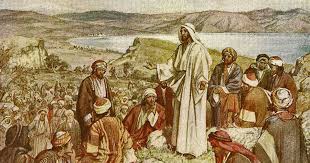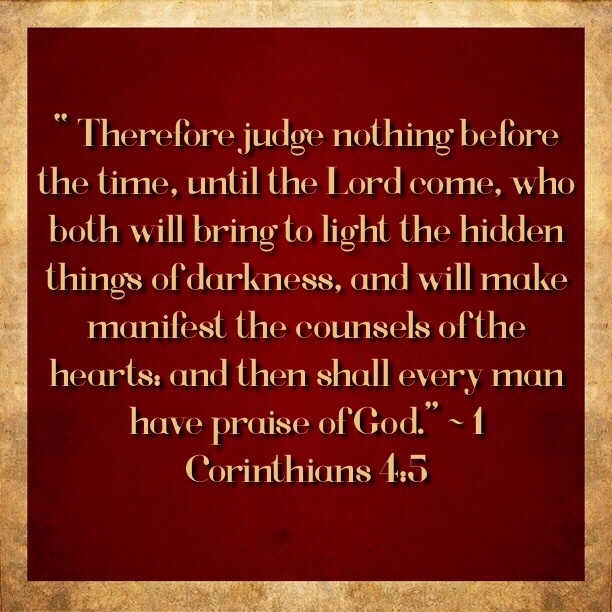
The Great Uncovering
"No one after lighting a lamp hides it under a jar, or puts it under a bed, but puts it on a lampstand, so that those who enter may see the light. For nothing is hidden that will not be disclosed, nor is anything secret that will not become known and come to light. Then pay attention to how you listen; for to those who have, more will be given; and from those who do not have, even what they seem to have will be taken away." (Luke 8:16-18) |

A Marvelous Message from Jesus
Luke 12-13

1 In the meantime, when an innumerable multitude of people had gathered together, so that they trampled one another, He began to say to His disciples first of all,
“Beware of the leaven of the Pharisees, which is hypocrisy.
2 “For there is nothing covered that will not be revealed, nor hidden that will not be known.
3 “Therefore whatever you have spoken in the dark will be heard in the light, and what you have spoken in the ear in inner rooms will be proclaimed on the housetops.
4 “And I say to you, My friends, do not be afraid of those who kill the body, and after that have no more that they can do.
5 “But I will show you whom you should fear: Fear Him who, after He has killed, has power to cast into hell; yes, I say to you, fear Him!
6 “Are not five sparrows sold for two copper coins? And not one of them is forgotten before God.
7 “But the very hairs of your head are all numbered. Do not fear therefore; you are of more value than many sparrows.
8 “Also I say to you, whoever confesses Me before men, him the Son of Man also will confess before the angels of God.
9 “But he who denies Me before men will be denied before the angels of God.
10 “And anyone who speaks a word against the Son of Man, it will be forgiven him; but to him who blasphemes against the Holy Spirit, it will not be forgiven.
11 “Now when they bring you to the synagogues and magistrates and authorities, do not worry about how or what you should answer, or what you should say.
12 “For the Holy Spirit will teach you in that very hour what you ought to say.”
13 Then one from the crowd said to Him, “Teacher, tell my brother to divide the inheritance with me.”
14 But He said to him, “Man, who made Me a judge or an arbitrator over you?”
15 And He said to them, “Take heed and beware of covetousness, for one’s life does not consist in the abundance of the things he possesses.”
16 Then He spoke a parable to them, saying: “The ground of a certain rich man yielded plentifully.
“And he thought within himself, saying, ‘What shall I do, since I have no room to store my crops?’
18 “So he said, ‘I will do this: I will pull down my barns and build greater, and there I will store all my crops and my goods.
19 ‘And I will say to my soul, “Soul, you have many goods laid up for many years; take your ease; eat, drink, and be merry.” ’
20 “But God said to him, ‘Fool! This night your soul will be required of you; then whose will those things be which you have provided?’
21 “So is he who lays up treasure for himself, and is not rich toward God.”
22 Then He said to His disciples, “Therefore I say to you, do not worry about your life, what you will eat; nor about the body, what you will put on.
23 “Life is more than food, and the body is more than clothing.
24 “Consider the ravens, for they neither sow nor reap, which have neither storehouse nor barn; and God feeds them. Of how much more value are you than the birds?
25 “And which of you by worrying can add one cubit to his stature?
26 “If you then are not able to do the least, why are you anxious for the rest?
27 “Consider the lilies, how they grow: they neither toil nor spin; and yet I say to you, even Solomon in all his glory was not arrayed like one of these.
28 “If then God so clothes the grass, which today is in the field and tomorrow is thrown into the oven, how much more will He clothe you, O you of little faith?
29 “And do not seek what you should eat or what you should drink, nor have an anxious mind.
30 “For all these things the nations of the world seek after, and your Father knows that you need these things.
31 “But seek the kingdom of God, and all these things shall be added to you.
32 “Do not fear, little flock, for it is your Father’s good pleasure to give you the kingdom.
33 “Sell what you have and give alms; provide yourselves money bags which do not grow old, a treasure in the heavens that does not fail, where no thief approaches nor moth destroys.
34 “For where your treasure is, there your heart will be also.
35 “Let your waist be girded and your lamps burning;
36 “and you yourselves be like men who wait for their master, when he will return from the wedding, that when he comes and knocks they may open to him immediately.
37 “Blessed are those servants whom the master, when he comes, will find watching. Assuredly, I say to you that he will gird himself and have them sit down to eat, and will come and serve them.
38 “And if he should come in the second watch, or come in the third watch, and find them so, blessed are those servants.
“But know this, that if the master of the house had known what hour the thief would come, he would have watched and not allowed his house to be broken into.
40 “Therefore you also be ready, for the Son of Man is coming at an hour you do not expect.”
41 Then Peter said to Him, “Lord, do You speak this parable only to us, or to all people?”
42 And the Lord said, “Who then is that faithful and wise steward, whom his master will make ruler over his household, to give them their portion of food in due season? 43 “Blessed is that servant whom his master will find so doing when he comes.
44 “Truly, I say to you that he will make him ruler over all that he has.
45 “But if that servant says in his heart, ‘My master is delaying his coming,’ and begins to beat the male and female servants, and to eat and drink and be drunk, 46 “the master of that servant will come on a day when he is not looking for him, and at an hour when he is not aware, and will cut him in two and appoint him his portion with the unbelievers.
47 “And that servant who knew his master’s will, and did not prepare himself or do according to his will, shall be beaten with many stripes.
48 “But he who did not know, yet committed things deserving of stripes, shall be beaten with few. For everyone to whom much is given, from him much will be required; and to whom much has been committed, of him they will ask the more.
49 “I came to send fire on the earth, and how I wish it were already kindled!
50 “But I have a baptism to be baptized with, and how distressed I am till it is accomplished!
51 “Do you suppose that I came to give peace on earth? I tell you, not at all, but rather division.
52 “For from now on five in one house will be divided: three against two, and two against three.
53 “Father will be divided against son and son against father, mother against daughter and daughter against mother, mother-in-law against her daughter-in-law and daughter-in-law against her mother-in-law.”
54 Then He also said to the multitudes, “Whenever you see a cloud rising out of the west, immediately you say, ‘A shower is coming’; and so it is.
55 “And when you see the south wind blow, you say, ‘There will be hot weather’; and there is.
56 “Hypocrites! You can discern the face of the sky and of the earth, but how is it you do not discern this time?
57 “Yes, and why, even of yourselves, do you not judge what is right?
58 “When you go with your adversary to the magistrate, make every effort along the way to settle with him, lest he drag you to the judge, the judge deliver you to the officer, and the officer throw you into prison.
59 “I tell you, you shall not depart from there till you have paid the very last mite.” (Luke 12:1-59)
13:1 There were present at that season some who told Him about the Galileans whose blood Pilate had mingled with their sacrifices.
2 And Jesus answered and said to them, “Do you suppose that these Galileans were worse sinners than all other Galileans, because they suffered such things? 3 “I tell you, no; but unless you repent you will all likewise perish.
4 “Or those eighteen on whom the tower in Siloam fell and killed them, do you think that they were worse sinners than all other men who dwelt in Jerusalem?
5 “I tell you, no; but unless you repent you will all likewise perish.”
6 He also spoke this parable: “A certain man had a fig tree planted in his vineyard, and he came seeking fruit on it and found none. 7 So he said to the gardener, “See here! For three years I have come looking for fruit on this fig tree, and still I find none. Cut it down! Why should it be wasting the soil?” 8 He replied, “Sir, let it alone for one more year, until I dig round it and put manure on it. 9 If it bears fruit next year, well and good; but if not, you can cut it down.” ’ (Luke 13:1-9)
(Special thanks to Precept Austin for their full Commentary on this passage. I have quoted from them extensively below in a green font.)
|
 The short public career of Jesus is full of surprises as one reads the four gospels. Much of the action takes place in Galilee or in Perea (modern Jordan), or in Samaria. Jesus had trained twelve disciples and taught them how to communicate His message (“the gospel of the kingdom”) in the villages of Israel—later without His direct on-site help.
The short public career of Jesus is full of surprises as one reads the four gospels. Much of the action takes place in Galilee or in Perea (modern Jordan), or in Samaria. Jesus had trained twelve disciples and taught them how to communicate His message (“the gospel of the kingdom”) in the villages of Israel—later without His direct on-site help.
Great crowds of tens of thousands followed Jesus and pressed him in droves as He traveled in Galilee. In Luke Chapter 10 we have the unique dispatch of 70 disciples to go before Him on His last trip to Jerusalem. They were to announce the coming in of the Kingdom of God on earth! (See The Seventy Sent Out and The One Hundred Forty Four Thousand.) Jesus had no film crew, no legal aid, no financial backing--(See Jesus Plain and Simple.)
The calling and training of the Twelve prepared them for how they would spend the rest of their lives (after the resurrection and ascension of their leader). Judas dropped out during their final week, as everyone knows, during their final week in Jerusalem, when Jesus was killed. Paul, Luke and others joined later. '
The Book of Acts gives us glimpses into the radical new assignment Jesus would call the 12 to, after His resurrection and ascension. Libraries are full of books on the history of the radical new calling Jesus gave to the disciples (now the apostles). All except John would be martyred.
Much of what Jesus has been doing from His present CEO post (at “the right hand of the majesty on high.”) -- in the invisible realm we call heaven -- is available data for all. This present era of the out-calling of the church, is delineated in history from God’s announced focus as seen in earlier and coming “dispensations.” Jesus has not always been calling people to be part of His ekklesia. There are other groups of saints down through history who belong to Jesus also, and there are great things God will do soon--while we (the church) “watch from the mezzanine” -- after the Rapture.
For two millennia Jesus has been calling out a church for His name, (see Matthew 16:27-19) as He said He would do. This ekklesia is not to be confused with the great false church we see everywhere in the world today! During this season of history Israel has been sidelined and is not the center of history. That will change radically after the departure of the church!
Hypocrisy! The first topic Jesus addresses in the message is about hypocrisy--which He says is the "leaven of the Pharisees."
Jesus said the Kingdom of God "is like leaven, which a woman took and hid in three pecks of flour until it was all leavened.” That is the "good" effect of leaven, but it serves to describe the influence of something or someone (good or evil) that works subtly to modify something else. Just as the leaven literally permeates the dough, the subtle (maybe not always so subtle) teachings of the Pharisees, would eventually "permeate" the thinking of those who listened to them. Jesus is saying, beware, take heed, protect yourselves from the permeating, fermenting influence of the Pharisees which will lead one straight to hell if followed! Their leaven must be avoided at all costs, lest it begin to exert its corrupting effect on one's mind and heart.
Hypocrisy (5272) (hupokrisis from hupo = under + krino = to judge; See also word study on Hypocrite = hupokrites) refers literally to delivery of a speech, along with interpretive gestures and imitation. The word hypocrisy comes from the Greek theater and referred to the practice of putting on a mask and playing a part on stage. The NT gives hupokrisis only a negative connotation referring to hypocrisy, duplicity (the quality of being double - belying of one’s true intentions by deceptive words or action), insincerity, dissimulation (hiding under a false appearance; hiding or disguising one's thoughts or feelings - don't we all do this from time to time?). The idea is to pretend, to act as something one is not and so to death of one's body act deceitfully, pretending to manifest traits like piety and love. It means to create a public impression that is at odds with one’s real purposes or motivations, and thus is characterized by play-acting, pretense or outward show. It means to give an impression of having certain purposes or motivations, while in reality having quite different ones. The first century Pharisees had mastered the art of "play acting," and took the practice of hypocrisy to a new level! Sadly, their "offspring" still exist in the Church and among those who profess to be believers in Jesus Christ. (from Precept Austin)
 Next Jesus addresses our fear of dying. "Since therefore the children share in flesh and blood, he himself likewise partook of the same things, that through death he might destroy the one who has the power of death, that is, the devil, and deliver all those who through fear of death were subject to lifelong slavery" (Hebrews 2:14-15). He says the death of the body is no big deal compared to what follows the death of the body!
Next Jesus addresses our fear of dying. "Since therefore the children share in flesh and blood, he himself likewise partook of the same things, that through death he might destroy the one who has the power of death, that is, the devil, and deliver all those who through fear of death were subject to lifelong slavery" (Hebrews 2:14-15). He says the death of the body is no big deal compared to what follows the death of the body!
In the last book of the Bible, the Revelation of Jesus Christ, the apostle John describes an incredible global event which I think will occur at the mid-point of the seven year period commonly referred to as the "Tribulation" (Daniel's Seventieth Week.) The mid-point of this seven years is demarcated by the abomination of desolation which Jesus described in Matthew 24:15, the event which "ignites" the last 3.5 years He referred to as "The Great Tribulation" (Matthew 24:21, Jeremiah 30:7) called "the time of Jacob’s distress" and Daniel 12:1 termed "a time of distress such as never occurred since there was a nation until that time"), during which the Antichrist carries out the most horrible holocaust the world has ever known. And so it should not surprise us that God would answer Habakkuk's prayer "In wrath remember mercy." (Habakkuk 3:2). And how does God "remember mercy" in the Revelation in a world on the edge of the impending, indescribable horrors of the Great Tribulation? You are probably wondering, how does this relate to "fear the One...fear Him?" Let's read John's words for the answer:
And I saw another angel flying in mid-heaven, having an eternal Gospel (the same one proclaimed throughout history) to preach to those who live on the earth, and to every nation and tribe and tongue and people (cf those who describes as saved in note; and he said with a loud voice, “Fear (aorist imperative = command calling them to "Do this now!" "Don't delay!" It is urgent!) God, and give (also aorist imperative) because the hour of His judgment has come; worship (proskuneo = bow down - aorist imperative) Him Who made the heaven and the earth and sea and springs of waters.”
 God pays Attention to Detail. More than 150,000 hairs are on your head (unless you are getting bald). How in the world can God keep track when hairs fall out every day and some are not replaced? Surely God has more important things to do? And what about one single hair falling out, does He catch that? He evidently doesn't have to acquire information from a Third Party. Jesus has the other 8000 million inhabitants on the planet to worry about! The point of Him saying this is: Look, you ought to fear God. He knows everything, everything, absolutely everything. (He's omniscient).
God pays Attention to Detail. More than 150,000 hairs are on your head (unless you are getting bald). How in the world can God keep track when hairs fall out every day and some are not replaced? Surely God has more important things to do? And what about one single hair falling out, does He catch that? He evidently doesn't have to acquire information from a Third Party. Jesus has the other 8000 million inhabitants on the planet to worry about! The point of Him saying this is: Look, you ought to fear God. He knows everything, everything, absolutely everything. (He's omniscient).
Back in the Old Testament, 1 Samuel 14:45, 2 Samuel 14:11, 1 Kings 1:52 is a familiar Old Testament phrase, "Not one hair of your head shall fall." By the way, that same phrase is in Luke 21:18, same thing about the hairs of your head. "Yet not a hair of your head will perish." That was God's way of saying when judgment comes, I'll protect you. I'll protect you. You'll also find it in Acts 27:34. God knows every hair on every person on the planet. He knows the minutest, most inconsequential details because if it is, He knows it. So don't think somehow you don't need to fear God because in the end something will slip by. Ah, it won't slip by. The truth will be uncovered, hell awaits the hypocrite, and God knows everything...You are more valuable (worth more) (1308) (diaphero from dia = separation, through + phéro = carry, bear) means literally to carry or take something through an area or structure. One of the meanings of diaphero is to "differ to one’s advantage from someone or something, be worth more than, be superior to" which is the nuance in this verse.
 Beware, and be on your guard against every form of greed - Observe the two commands which are "synergistic" for beware means to perceive. Covetousness by its very nature is subtle and can slither into a heart if one is not on continually on the lookout (We all understand this pernicious pitfall don't we, whether its our neighbor's new car, etc). So first you have to "see" the slithering sin, and secondly, you have to put up a guard around your heart so that it can't gain easy entrance. Every form is literally "all" but this translation does rightly suggest that "greed" or "covetousness" comes in different "shapes and sizes" but ALL are similarly sinister! Be ware and be on guard. Jesus' words remind me of the fencing term En garde which of course is French for "on guard" and is spoken at outset of the engagement to warn the participants to take a defensive position...
Beware, and be on your guard against every form of greed - Observe the two commands which are "synergistic" for beware means to perceive. Covetousness by its very nature is subtle and can slither into a heart if one is not on continually on the lookout (We all understand this pernicious pitfall don't we, whether its our neighbor's new car, etc). So first you have to "see" the slithering sin, and secondly, you have to put up a guard around your heart so that it can't gain easy entrance. Every form is literally "all" but this translation does rightly suggest that "greed" or "covetousness" comes in different "shapes and sizes" but ALL are similarly sinister! Be ware and be on guard. Jesus' words remind me of the fencing term En garde which of course is French for "on guard" and is spoken at outset of the engagement to warn the participants to take a defensive position...
"For you know the grace of our Lord Jesus Christ, that though He was rich, yet for your sakes He became poor, that you through His poverty might become rich." (2 Corinthians 8:6)
"Now godliness with contentment is great gain. For we brought nothing into this world, and it is certain we can carry nothing out. And having food and clothing, with these we shall be content. But those who desire to be rich fall into temptation and a snare, and into many foolish and harmful lusts which drown men in destruction and perdition. For the love of money is a root of all kinds of evil, for which some have strayed from the faith in their greediness, and pierced themselves through with many sorrows." (1 Timothy 6:6-10)
 Be dressed in readiness (4024) (perizonnumi from perí = about or around + zonnumi = gird around especially with a belt) means to gird all around as preparation for work or activity. Figuratively, perizonnumi speaks of readiness for activity while ungirding denotes rest. This picture derives from the custom of shortening the long flowing garments of Orientals which were pulled up and knotted at the waist for freedom of movement. The idea is to tuck up one’s long garment by pulling it through a belt. From the belt hung the scabbard in which the soldier's sword was sheathed. The belt tied tightly around the waist indicated that a soldier was ready for combat. '
Be dressed in readiness (4024) (perizonnumi from perí = about or around + zonnumi = gird around especially with a belt) means to gird all around as preparation for work or activity. Figuratively, perizonnumi speaks of readiness for activity while ungirding denotes rest. This picture derives from the custom of shortening the long flowing garments of Orientals which were pulled up and knotted at the waist for freedom of movement. The idea is to tuck up one’s long garment by pulling it through a belt. From the belt hung the scabbard in which the soldier's sword was sheathed. The belt tied tightly around the waist indicated that a soldier was ready for combat. '
Conversely, to slacken the belt equated with the soldier going off duty, something that is never to be in a Christian soldier. We are always on duty, for our foe never rests.
Hold the fort for I am coming,
Jesus signals still,
Send the answer back to heaven,
"By Thy grace we will."
Note that be dressed for readiness (ESV = "dressed for action") is in the perfect tense which speaks of a completed action with ongoing effect or result and so speaks of the permanence of this action. In other words, the implication of this tense is that one is not to wait to the last moment to tuck their long, flowing garment in, but is to always be prepared to act!
Believers are to like children of Israel were called to be on the first Passover. Moses records
'Now you shall eat it in this manner: with your loins girded (LXX uses same verb - perizonnumi), your sandals on your feet, and your staff in your hand; and you shall eat it in haste-- it is the LORD'S Passover.
The picture is of the Passover night in Egypt. The lamb has been slain, the houses protected by the blood of the blemish-free lamb (cf 1 Peter 1:18-19), and each Hebrew was to have his loins girded, waiting for marching orders. Even more so should be the attitude of God's children who now wait expectantly for "Christ our Passover" (1 Corinthians 5:7)!
Perizonnumi - Used 6 times in NT - Luke 12:35; Luke 12:37; Luke 17:8; Ephesians 6:14; Rev. 1:13; Rev. 15:6.
See discussion of gird your loins, how the ancients girded their loins
Note - "Let your loins be girded," an idiom referring to the practice of tucking the ends of the long cloak (outer garment) into the belt to shorten it in preparation for activities like running, etc.
Peter uses the related verb anazonnumi (ana = up ~ stresses lifting up of long robe + zonnumi = bind about with a belt) exhorting saints.
Therefore, prepare your minds for action (gird up the loins of your mind), keep sober in spirit, fix your hope completely on the grace to be brought to you at the revelation of Jesus Christ. (1 Peter 1:13-note)
This same image of girding your loins as you prepare to move is found in Luke 17:8; Exodus 12:11; 1 Kings 18:46; 2 Kings 4:29; 9:1; Ephesians 6:14.
Keep your lamps lit - Lit is in the present tense means continually lit. Keep them burning. The picture is of a disciple who is ready at all times. One English definition of ready is "poised for action." I like that picture. Luke uses this same verb (lit) one other time figuratively to describe the disciples' "hearts burning within...while He (the resurrected Lord Jesus) was speaking to (them) on the road." (Luke 24:32) Luke had earlier mentioned lighting a lamp n Luke 8:16 and Luke 11:33 (but both use a different verb hapto, not the verb kaio).
While the main point of your lamps lit in context is readiness for His return, disciples with "lamps lit" also speaks of the light emitted from our supernatural lives which point those in spiritual darkness to God and Jesus the Light of the world. In the Sermon on the Mount, Jesus taught... You (DISCIPLES) are the light of the world. A city set on a hill cannot be hidden; nor does anyone light a lamp and put it under a basket, but on the lampstand, and it gives light to all who are in the house. Let your light shine (A COMMAND) before men in such a way (THIS IS KEY CAVEAT - SO THAT ULTIMATELY IT POINTS TO GOD NOT US) that they may see your good works, and glorify (GIVE A PROPER OPINION OF) your Father Who is in heaven" (HE IS INVISIBLE BUT IN A SENSE MADE "VISIBLE" BY OUR SPIRIT ENERGIZED SUPERNATURAL LIVES AND SUPERNATURAL WORKS) (Matthew 5:14-16)
Paul echoes this principle: Do all things without grumbling or disputing; 15 so that you will prove yourselves to be blameless and innocent, children of God above reproach in the midst of a crooked and perverse generation, among whom you appear as lights in the world, 16 holding fast the word of life, so that in the day of Christ I will have reason to glory because I did not run in vain nor toil in vain. (Philippians 2:14-16) (from Precept Austin)
 The rich fool looked upon himself as a successful man, but God didn't agree. True success is to find one's place and to fill it — to seek first the kingdom of God and his righteousness! You may be poor, have relatively little talent, and be quite unable to do anything that looks big; how-ever, if you are faithfully handling the task God has given to you, in complete yieldedness to His will, you will find true happiness. God eventually will give an accurate estimate of your life; then "many who are last shall be first; and the first last!"
James the brother of Jesus and Apostle of the First Century Church in Jerusalem wrote a powerful short letter to early followers of Jesus who had scattered from Israel because of persecution. His indictment of the selfishly rich is very powerful. James warns that we brought nothing into the world and we can take nothing out with us when our time is up. The pursuit of wealth, status, position in the world is a deadly distraction.
The rich fool looked upon himself as a successful man, but God didn't agree. True success is to find one's place and to fill it — to seek first the kingdom of God and his righteousness! You may be poor, have relatively little talent, and be quite unable to do anything that looks big; how-ever, if you are faithfully handling the task God has given to you, in complete yieldedness to His will, you will find true happiness. God eventually will give an accurate estimate of your life; then "many who are last shall be first; and the first last!"
James the brother of Jesus and Apostle of the First Century Church in Jerusalem wrote a powerful short letter to early followers of Jesus who had scattered from Israel because of persecution. His indictment of the selfishly rich is very powerful. James warns that we brought nothing into the world and we can take nothing out with us when our time is up. The pursuit of wealth, status, position in the world is a deadly distraction.
Let the lowly brother glory in his exaltation, but the rich in his humiliation, because as a flower of the field he will pass away. For no sooner has the sun risen with a burning heat than it withers the grass; its flower falls, and its beautiful appearance perishes. So the rich man also will fade away in his pursuits. (James 1:9-11)
Furthermore, material wealth, property and ambition easily keep us from pursuing a life pleasing to God. James alludes to the springtime flowers in a green meadow in the mountains. The burst of beauty fades in a few weeks’ time as the heat of summer comes in. We don’t like to imagine that our whole lives have been lived for nothing! “A Wasted Life” is something most people shun. The reality is that life is not about us. It’s about Jesus! This is the way things really are!
A neglected subject among pastors and Bible teachers is money and all the associated factors. The “love of money,” not money, is “a root of all evil.
“Now godliness with contentment is great gain. For we brought nothing into this world, and it is certain we can carry nothing out. And having food and clothing, with these we shall be content. But those who desire to be rich fall into temptation and a snare, and into many foolish and harmful lusts which drown men in destruction and perdition. For the love of money is a root of all kinds of evil, for which some have strayed from the faith in their greediness, and pierced themselves through with many sorrows."
The Apostle Paul said,
But you, O man of God, flee these things and pursue righteousness, godliness, faith, love, patience, gentleness. Fight the good fight of faith, lay hold on eternal life, to which you were also called and have confessed the good confession in the presence of many witnesses. I urge you in the sight of God who gives life to all things, and before Christ Jesus who witnessed the good confession before Pontius Pilate, that you keep this commandment without spot, blameless until our Lord Jesus Christ’s appearing, which He will manifest in His own time, He who is the blessed and only Potentate, the King of kings and Lord of lords, who alone has immortality, dwelling in unapproachable light, whom no man has seen or can see, to whom be honor and everlasting power. Amen.” (1 Timothy 6:6-16)
It is not difficult to see from history that our race is deeply indebted to God. He is patient and long-suffering and a day of accountability for all the world is inevitable for everyone!
One glaring illustration is the soaring national debt of the United States.
 To whom do we owe 23 trillion dollars?
To whom do we owe 23 trillion dollars?
God is the Source of everything we have and are! Is there accountability? Yes!
“You have heard that it was said to those of old, 'You shall not murder, and whoever murders will be in danger of the judgment.’ But I say to you that whoever is angry with his brother without a cause shall be in danger of the judgment. And whoever says to his brother, Raca!’ shall be in danger of the council. But whoever says, ‘You fool!’ shall be in danger of hell fire. Therefore if you bring your gift to the altar, and there remember that your brother has something against you, leave your gift there before the altar, and go your way. First be reconciled to your brother, and then come and offer your gift. Agree with your adversary quickly, while you are on the way with him, lest your adversary deliver you to the judge, the judge hand you over to the officer, and you be thrown into prison. Assuredly, I say to you, you will by no means get out of there till you have paid the last penny.'" (Matthew 5:21-26)
The world banking system is worth scrutinizing but I leave that to others in this brief overview. It’s sufficient here to remind ourselves that we are debtors to all men and to God.
Vast amounts of wealth have changed hands since the rise of civilization. One point of reference is the amount of gold and silver once housed in Solomon’s temple in Jerusalem, The Treasures of the House of the Lord. See also The Money Papers.
Jesus assumed all our guilt and shame when He died as our substitute. When we are identified with Jesus and His death on our behalf, we are made entirely new!
Therefore if anyone is in Christ, he is a new creation: old things have passed away; behold all things have become new! (2 Corinthians 5:17)

 "For as the lightning comes from the east and flashes to the west, so also will the coming of the Son of Man be. For wherever the carcass is, there the eagles will be gathered together. (Matthew 24:27, 28)
"For as the lightning comes from the east and flashes to the west, so also will the coming of the Son of Man be. For wherever the carcass is, there the eagles will be gathered together. (Matthew 24:27, 28)
The word the Lord uses for "coming" here is the now familiar "parousia." It is quite a different word than he uses a few verses farther on when he speaks of "the Son of man coming on the clouds of heaven with power and great glory." It is easy to confuse these two comings because of his reference to lightning in verse 27. Since lightning is a form of power and glory, many feel the Lord is using it as a symbol of his coming in glory.
But note carefully what he says.
Lightning flashes in the east, but the effect of it is seen all over the sky. Yet the flash itself does not involve the whole inverted dome of the heavens from east to west. When he uses the symbol of lightning, therefore, he is not describing a universally visible manifestation of his glory, but the universal effect of his presence behind the scenes. Like lightning flashes he will be seen by his own in different places, at all different times, but the effect of those appearances will be felt throughout the earth.
Furthermore, lightning is sovereign, unpredictable, uncontrollable. So will be the presence, the parousia, of the Son of man.
He will appear and disappear at will. Whenever there is need for him he will be there, just as he was during the post resurrection period. There will be no need to search for him for he cannot be found that way. There will be no need to look for him in the wilderness nor in the inner rooms, for he will come whenever and wherever he finds a heart ready to know him. In the passage parallel to this in Luke 17, Jesus says, "For as the lightning flashes and lights up the sky from one side to the other, so will the Son of man be in his day." A "day" used in that sense always refers to a period of time, not a sudden, climactic event.
Then, using a common proverb of the day, Jesus indicates the proper way to find him in that day, "Wherever the body is, there the eagles will be gathered together." Rather than eagles, the margin gives the proper word, vultures: "there the [vultures] will be gathered together."
When I was a boy in a remote high school in Montana, we were having basketball practice one night. At the close of the practice period the coach called one of the team members aside. I watched him go to the other side of the room. The boy was a close friend of mine and came from a rather poor family who were trying to eke out a living on a ranch about ten miles north of town. As I watched the lad's face while the coach was talking to him, I saw it blanch and after a bit the boy walked off with his head down. The coach came over to us and said, "I just gave Joe some bad news. His dad has been found dead." Then he told us how he was found.
One of the neighbors owned a ranch about four or five miles away, but separated from Joe's home by a deep canyon. The man had looked over and noticed that there was no smoke rising from the ranch house, so he saddled a horse and rode over. When he came to the silent cabin and found no one around, he began to wonder if anything had happened. As he looked about he saw in the sky about a half mile off, a number of buzzards, a type of vulture. Mounting his horse again he rode off to investigate. Beneath the spot where the buzzards circled he found the body of Joe's father. I have never forgotten that incident, and every time I read this verse I think of it. "Wherever the body is, there the [vultures] will be gathered together."
What does our Lord mean by this? Does he mean that he is a body, a decaying corpse? No, he is simply taking a common parable which meant that whenever the question of "where" arises about a subject, then look for some identifying activity. We have a similar proverb today, "Where there's smoke, there's fire."
In that day men will ask, "Where is Jesus Christ? How do you find him? Where is he?" The answer is, wherever you see the signs of his activity. They are always unmistakable. He comes to transform life, to make it over anew. He comes to remove delusion and deceit and to lead instead into truth and reality. He comes to deliver from guilt, from fear, and from hate. Even in those terrible days of unheard-of violence, cruelty, and death, he will be busy with his everlasting ministry. If you want to know where he is working, look for the sign of transformed lives.
It has always been true. It will be true in the days of his glorified presence on earth, but it is also true now, in the day of his spiritual presence. He is sovereign, uncontrollable, unlimited by geography. False faiths forever say "We have a corner on Christ," but the true faith says he is universally available. He is at the instant disposal of any heart which in humility and contriteness is ready to do business with him." (Ray Stedman, The Secret Presence)



For Christ has not entered the holy places made with hands, which are copies of the true,
but into heaven itself, now to appear in the presence of God for us;
not that He should offer Himself often, as the high priest enters the Most Holy Place every year with blood of another
— He then would have had to suffer often since the foundation of the world;
but now, once at the end of the ages, He has appeared to put away sin by the sacrifice of Himself.
And as it is appointed for men to die once, but after this the judgment,
so Christ was offered once to bear the sins of many.
To those who eagerly wait for Him He will appear a second time, apart from sin, for salvation.“
(Hebrews 9:24-28)

For you have not come to the mountain that may be touched and that burned with fire, and to blackness and darkness,
and the sound of a trumpet and the voice of words, so that those who heard it begged that the word should not be spoken to them anymore.
(For they could not endure what was commanded: “And if so much as a beast touches the mountain, it shall be stoned or shot with an arrow.”
And so terrifying was the sight that Moses said, “I am exceedingly afraid and trembling.”)
But you have come to Mount Zion and to the city of the living God, the heavenly Jerusalem, to an innumerable company of angels,
to the general assembly and church of the firstborn who are registered in heaven, to God the Judge of all, to the spirits of just men made perfect,
to Jesus the Mediator of the new covenant, and to the blood of sprinkling that speaks better things than that of Abel.
See that you do not refuse Him who speaks. For if they did not escape who refused Him who spoke on earth, much more shall we not escape if we turn away from Him who speaks from heaven,
whose voice then shook the earth; but now He has promised, saying, “Yet once more I shake not only the earth, but also heaven.”
Now this, “Yet once more,” indicates the removal of those things that are being shaken, as of things that are made, that the things which cannot be shaken may remain.

Therefore, since we are receiving a kingdom which cannot be shaken,
let us have grace,
by which we may serve God acceptably with reverence and godly fear.
For our God is a consuming fire.“
(Hebrews 12:18-29) |

References
Jesus Plain and Simple
The Pure in Heart
Jesus is Lord of the Dance
(The Temple of the Lord)3
The Choirs of Heaven
Pots, Potters and Clay
We Are All Accountable!
Forwarding Address
Connections
Riches
The Parables of Jesus
The Wasted Years
God and the Quality of Time

Music
On Jordan's Stormy Banks
Fifty Miles of Elbow Room
Marching to Zion
Lambert's Music Library

Lambert's Main Library
Email is welcome: Lambert Dolphin
Archive for Newsletters
Library Annex
(700+ new articles since 2018. Free.)

September 8, 2021. February 18, 2023. April 13, 2023.




 The short public career of Jesus is full of surprises as one reads the four gospels. Much of the action takes place in Galilee or in Perea (modern Jordan), or in Samaria. Jesus had trained twelve disciples and taught them how to communicate His message (“the gospel of the kingdom”) in the villages of Israel—later without His direct on-site help.
The short public career of Jesus is full of surprises as one reads the four gospels. Much of the action takes place in Galilee or in Perea (modern Jordan), or in Samaria. Jesus had trained twelve disciples and taught them how to communicate His message (“the gospel of the kingdom”) in the villages of Israel—later without His direct on-site help.  Next Jesus addresses our fear of dying. "Since therefore the children share in flesh and blood, he himself likewise partook of the same things, that through death he might destroy the one who has the power of death, that is, the devil, and deliver all those who through fear of death were subject to lifelong slavery" (Hebrews 2:14-15). He says the death of the body is no big deal compared to what follows the death of the body!
Next Jesus addresses our fear of dying. "Since therefore the children share in flesh and blood, he himself likewise partook of the same things, that through death he might destroy the one who has the power of death, that is, the devil, and deliver all those who through fear of death were subject to lifelong slavery" (Hebrews 2:14-15). He says the death of the body is no big deal compared to what follows the death of the body!
 God pays Attention to Detail. More than 150,000 hairs are on your head (unless you are getting bald). How in the world can God keep track when hairs fall out every day and some are not replaced? Surely God has more important things to do? And what about one single hair falling out, does He catch that? He evidently doesn't have to acquire information from a Third Party. Jesus has the other 8000 million inhabitants on the planet to worry about! The point of Him saying this is: Look, you ought to fear God. He knows everything, everything, absolutely everything. (He's omniscient).
God pays Attention to Detail. More than 150,000 hairs are on your head (unless you are getting bald). How in the world can God keep track when hairs fall out every day and some are not replaced? Surely God has more important things to do? And what about one single hair falling out, does He catch that? He evidently doesn't have to acquire information from a Third Party. Jesus has the other 8000 million inhabitants on the planet to worry about! The point of Him saying this is: Look, you ought to fear God. He knows everything, everything, absolutely everything. (He's omniscient). Beware, and be on your guard against every form of greed - Observe the two commands which are "synergistic" for beware means to perceive. Covetousness by its very nature is subtle and can slither into a heart if one is not on continually on the lookout (We all understand this pernicious pitfall don't we, whether its our neighbor's new car, etc). So first you have to "see" the slithering sin, and secondly, you have to put up a guard around your heart so that it can't gain easy entrance. Every form is literally "all" but this translation does rightly suggest that "greed" or "covetousness" comes in different "shapes and sizes" but ALL are similarly sinister! Be ware and be on guard. Jesus' words remind me of the fencing term En garde which of course is French for "on guard" and is spoken at outset of the engagement to warn the participants to take a defensive position...
Beware, and be on your guard against every form of greed - Observe the two commands which are "synergistic" for beware means to perceive. Covetousness by its very nature is subtle and can slither into a heart if one is not on continually on the lookout (We all understand this pernicious pitfall don't we, whether its our neighbor's new car, etc). So first you have to "see" the slithering sin, and secondly, you have to put up a guard around your heart so that it can't gain easy entrance. Every form is literally "all" but this translation does rightly suggest that "greed" or "covetousness" comes in different "shapes and sizes" but ALL are similarly sinister! Be ware and be on guard. Jesus' words remind me of the fencing term En garde which of course is French for "on guard" and is spoken at outset of the engagement to warn the participants to take a defensive position... Be dressed in readiness (4024) (perizonnumi from perí = about or around + zonnumi = gird around especially with a belt) means to gird all around as preparation for work or activity. Figuratively, perizonnumi speaks of readiness for activity while ungirding denotes rest. This picture derives from the custom of shortening the long flowing garments of Orientals which were pulled up and knotted at the waist for freedom of movement. The idea is to tuck up one’s long garment by pulling it through a belt. From the belt hung the scabbard in which the soldier's sword was sheathed. The belt tied tightly around the waist indicated that a soldier was ready for combat. '
Be dressed in readiness (4024) (perizonnumi from perí = about or around + zonnumi = gird around especially with a belt) means to gird all around as preparation for work or activity. Figuratively, perizonnumi speaks of readiness for activity while ungirding denotes rest. This picture derives from the custom of shortening the long flowing garments of Orientals which were pulled up and knotted at the waist for freedom of movement. The idea is to tuck up one’s long garment by pulling it through a belt. From the belt hung the scabbard in which the soldier's sword was sheathed. The belt tied tightly around the waist indicated that a soldier was ready for combat. ' The rich fool looked upon himself as a successful man, but God didn't agree. True success is to find one's place and to fill it — to seek first the kingdom of God and his righteousness! You may be poor, have relatively little talent, and be quite unable to do anything that looks big; how-ever, if you are faithfully handling the task God has given to you, in complete yieldedness to His will, you will find true happiness. God eventually will give an accurate estimate of your life; then "many who are last shall be first; and the first last!"
James the brother of Jesus and Apostle of the First Century Church in Jerusalem wrote a powerful short letter to early followers of Jesus who had scattered from Israel because of persecution. His indictment of the selfishly rich is very powerful. James warns that we brought nothing into the world and we can take nothing out with us when our time is up. The pursuit of wealth, status, position in the world is a deadly distraction.
The rich fool looked upon himself as a successful man, but God didn't agree. True success is to find one's place and to fill it — to seek first the kingdom of God and his righteousness! You may be poor, have relatively little talent, and be quite unable to do anything that looks big; how-ever, if you are faithfully handling the task God has given to you, in complete yieldedness to His will, you will find true happiness. God eventually will give an accurate estimate of your life; then "many who are last shall be first; and the first last!"
James the brother of Jesus and Apostle of the First Century Church in Jerusalem wrote a powerful short letter to early followers of Jesus who had scattered from Israel because of persecution. His indictment of the selfishly rich is very powerful. James warns that we brought nothing into the world and we can take nothing out with us when our time is up. The pursuit of wealth, status, position in the world is a deadly distraction.
 To whom do we owe 23 trillion dollars?
To whom do we owe 23 trillion dollars?  "For as the lightning comes from the east and flashes to the west, so also will the coming of the Son of Man be. For wherever the carcass is, there the eagles will be gathered together. (Matthew 24:27, 28)
"For as the lightning comes from the east and flashes to the west, so also will the coming of the Son of Man be. For wherever the carcass is, there the eagles will be gathered together. (Matthew 24:27, 28)




